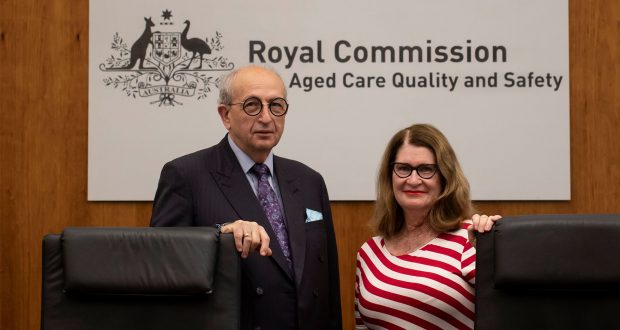In a surprising interaction at Thursday’s final hearing into the aged care royal commission, Commissioner Lynelle Briggs appeared to attack the recommendations of the counsels assisting midway through the hearing.
The first morning of the two-day hearing saw Counsel assisting Peter Gray start running through the salient points of the mammoth 124 recommendations, explaining what evidence led them to those recommendations.
Gray had gone through a few big-ticket items on the proposed reforms in detail, including the creation of a new Aged Care Commission, an Aged Care Advisory Council and the creation of an inspector general of aged care – all independent oversight bodies – before Briggs interjected with her own view on the topic.
Describing the recommendations as extraordinary and courageous – which did not seem to be a compliment – Briggs challenged the counsels assisting, asserting that finding land, building offices and staffing any new bodies would take too long and cost too much. She also strangely took aim at the idea that the new bodies would lie outside of Canberra.
“I’d really like to hear the public’s views as to whether taking the core government aged care instrumentality out of the public service and making it independent of the executive government and the minister would be in the best interests of older Australians,” she said.
“I’m yet to hear you present arguments, counsel, as to how the [Australian Aged Care] commission will improve the quality and safety of care for older Australians or how any such benefits would outweigh the very substantial costs and disruption involved in such a radical transformation of the government's administrative machinery.”
She went on to give her view that any reform of aged care should be brought about through a revamp of current bodies and the health department, before praising recent government action on aged care.
“I have had, however, detected over the last year, counsel, a growing determination among officials, and on the government, to fix the problems of the aged care system and to pursue a genuine reform agenda,” she said.
A new department of “Health and Ageing” would be the way to go she said, it would be “more proactive” in the way it goes about its business, and “steward” providers towards providing care that puts people first.
This department would answer to the new minister for Health and Ageing and would be staffed and funded appropriately, she said.
Furthermore, she said, the Aged Care Quality and Safety commission would stay intact, but be “reconstituted” and “revitalised” so it can be the “tough cop on the beat” that is more “curious” and “energetic” in its pursuit of better aged care performance.
It was a rare insight into the thoughts of the commissioner, made more revealing when commissioner Pagone disagreed with his colleague, appearing to walk back her comments.
“Mr Gray obviously those remarks are not intended to be a final decision by us,” he said.
“They indicate that there are different views about how one may go about the system … and of course we would welcome different views. I suspect that my own view is much closer aligned to that which you have put forward and I don’t think that the description of them as ‘courageous’ is quite the right description.”
Pagone then took the time to balance Brigg’s praise of government involvement in aged care with his own feelings on a memorandum – detailed in the day’s submission – that showed previous government’s attempts to limit aged care funding with the introduction of the 1997 aged care act.
It identified “the ‘billions’ in savings that had been achieved to that time by ‘capping service provision’” and also detailed the “options” the government had to reduce the cost of aged care, including applying quotas to numbers of people at various care levels.
Counsel assisting Gray had told the commissioners that the memorandum is evidence that essential human services placed in the hands of the government of the day, and subject to financial pressures of the day, could lead to an erosion of the quality of care.
“While we are obviously going to seek the responses of the public, including those elements of the government that [Briggs] just indicated. The reference this morning to the internal memoranda of 1997 shows what some might regard as a rather cynical approach, you’ve got the combination of the people spending the money and those guiding the money. And we will be very keen to see what responses there are,” Pagone said.
“Obviously, at the end of the day, we will need to form a view, or possibly different views, on the model going forward.”
This short ten-minute exchange was unusual as it is one of the few times over the past two years that the royal commission team did not seem to be on the same page – outwardly at least.
It was interesting as it puts forth a few questions. How did Briggs come up with her plan? Where is her evidence and research backing it up? Why did she choose now to bring it up? Why is she so concerned how much it will cost to fix a system she described as “cruel and harmful”? And how will the commissioners come up with a recommendation if they are this far apart on a key reform recommendation?
Do you have an idea for a story?Email [email protected]
 Aged Care Insite Australia's number one aged care news source
Aged Care Insite Australia's number one aged care news source

